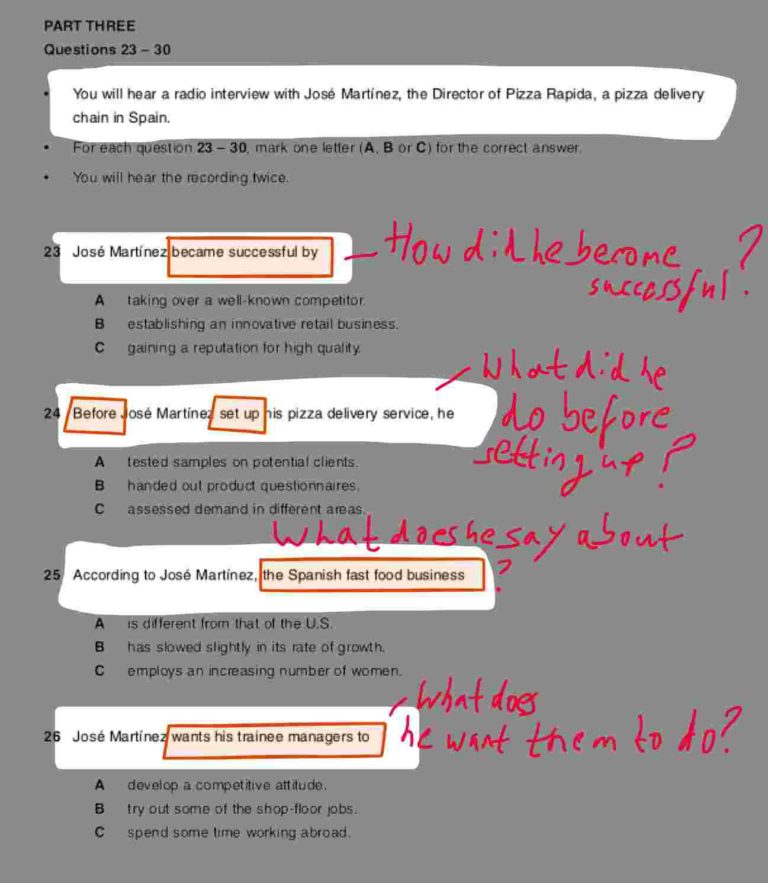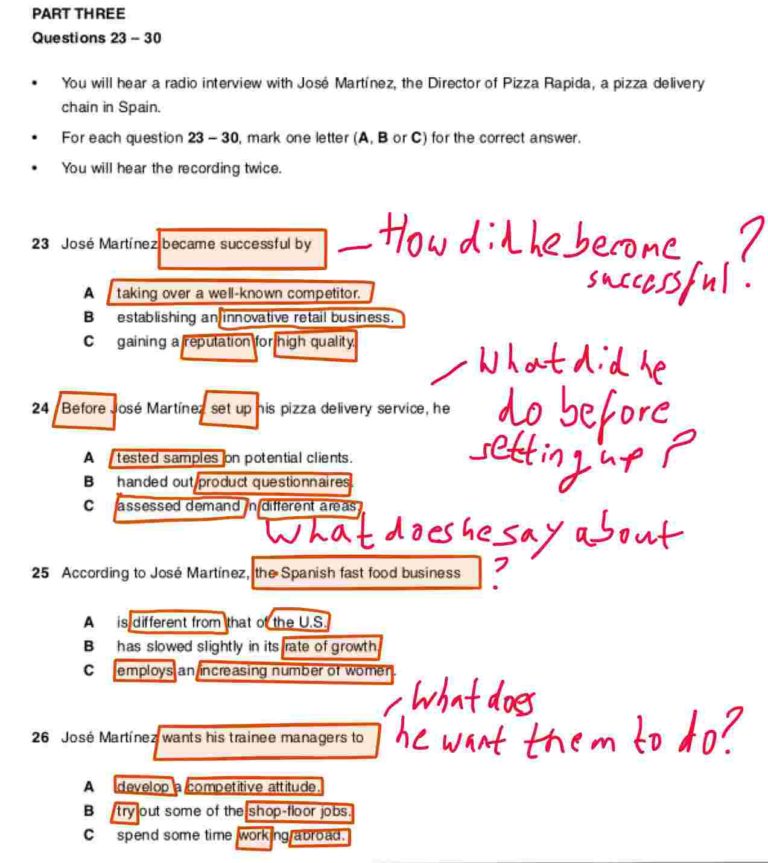B2 Business Vantage (BEC Vantage)
Listening Part Three. Eight points.
The Task
In this part of the exam you will hear an interview or a conversation. You will have to answer 8 multiple choice questions. You will receive one point for each correct answer. There are 3 possible answers shown but only one is correct. The answers are in the same order as the questions.
Introduction Length – 1 minute 15 seconds.
You can download the audio file here and the answers to the complete test here.
Procedure one – For people who are comfortable and confident with listening.
Read the questions first and try NOT to read the three possible answers. This is because reading the questions is the priority. Also, two of the three options are wrong and you might get distracted.
Highlight the question word. This will help you focus on what you are listening for. If there is no question word and the “question” is a sentence, then make a question word. If the sentence includes because, the question word is “why”. If it talks about objects, the questions is “what” . If it mentions places then the question word is “when”.

- Highlight the keywords. These can be extra words which can change or modify the meaning if the sentence, for example, normally, mainly or main, the best. It is important to highlight these words because the listening will usually mention two or all of the three options but is only one that is the specific answer and relates directly to the questions.
During the first listen, LISTEN, and respond. Do not read the A B C options. Listen and try to hear and understand the answer. When you hear the answer, write it in your own words.
During the second listen, you know what is important and where the answer is. Read the A B C options, choose the option which corresponds with your answers and when you hear the answer part use it to confirm your answer.
Procedure two , For people who are less confident at listening.
Read the questions AND the three possible answers.
Highlight the question word, this will help you focus on what you are listening for. If there is no question word and the “question” is a sentence, then make a question word. If the sentence includes because, the question word is “why”, if it talks about objects, the questions is “what”, if it mentions places then the question word is “when”.

- Highlight the keywords in the questions AND the answers.
When you read the three A B C options focus on the differences between each one. These can be extra words which can change or modify the meaning if the sentence, for example, normally, mainly or main, the best. It is important to highlight these words because the listening will usually mention two or all of the three options but is only one that is the specific answer and relates directly to the questions.
During the first listening, listen for the part which discusses each question and try to choose one possible answer. If it is difficult to choose then try to eliminate one option which you are confident is not correct.
During the second listen, be ready and focus on the specific information related to the questions and make a decision about which A B C option to choose.
Transfer time
You are finished, the listening is over.
But in fact, you still have some work to do. Working well in this part can give you extra points.
When Part Three finishes you have a whole wonderful ten minutes given to you to “transfer” your answers to the official answer sheet.
This extra time is very valuable, but you need to be careful and use it.
Part One
Here you need to change your notes into the ONE or TWO words required for the answer. In the procedure, I advised you to write what you hear so you may have written more than one or two wordes. If this is the case, decide on which words are the exact answer to the question. Check carefully for spellings that are difficult, long numbers, or reference numbers with a combination of letters and numbers. There is no point hearing it correctly and then writing it incorrectly. Believe me, people can LOSE points here just when writing.
Part Two
There is no special technique here, add the answers you decided were correct during the listening.
Part Three
If you find Part Three difficult you can transfer these answers first because you have just finished listening to part four. Here it can be used to review your notes but also the logic of your answers. I feel that student can often forget to use logic and their own professional knowledge. So here check that the answer you chose during the stress of the listening is logical.